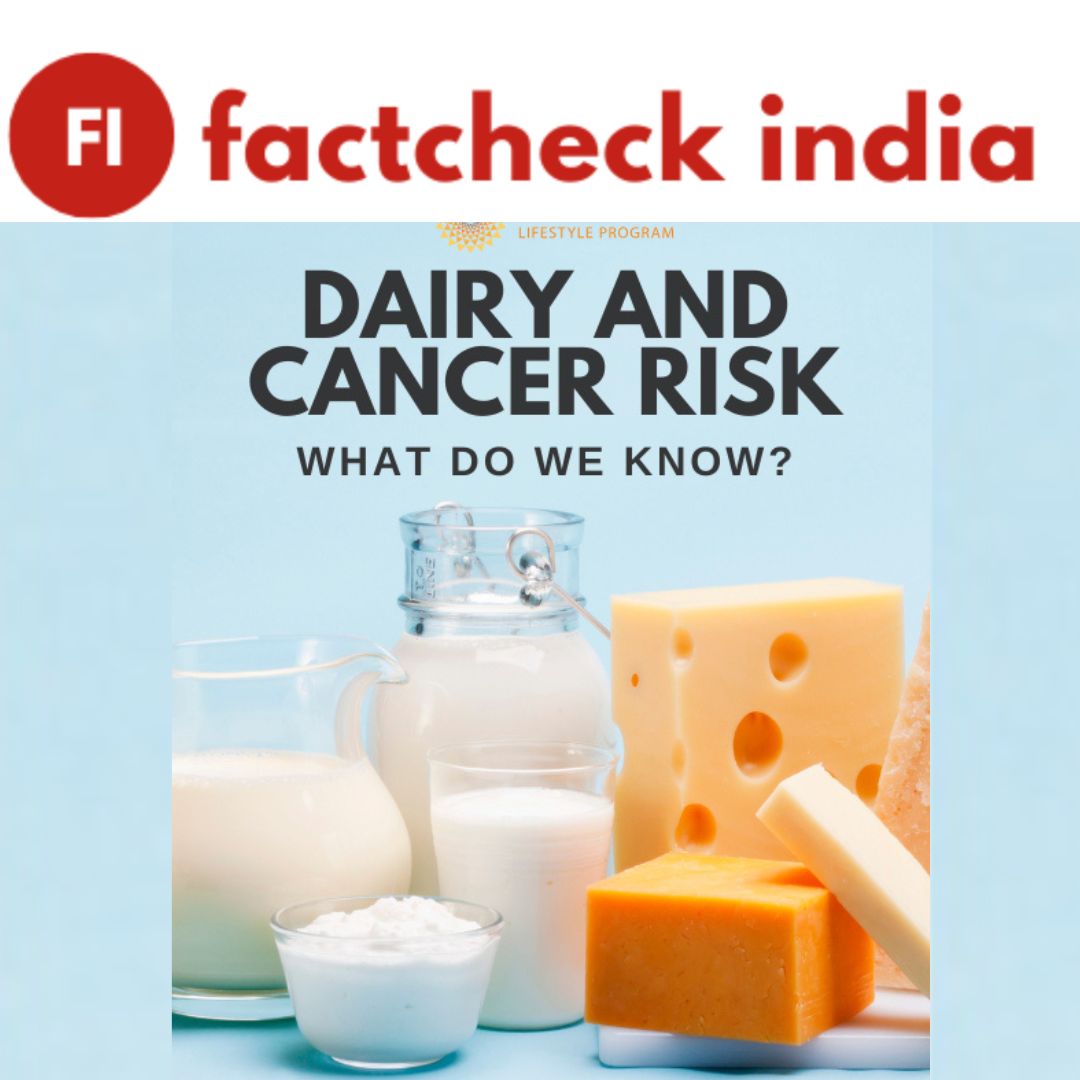The Claim: The viral post suggests that cow milk and ghee serve as “the best medicine to treat cancer patients,” presenting these common dairy products as potential cancer cures.
Fact: No evidence backs this claim.
Synopsis:
Viral Health Claim Under Investigation
A tweet gaining significant traction across social media platforms has sparked widespread discussion about an extraordinary medical claim. The viral post suggests that cow milk and ghee serve as “the best medicine to treat cancer patients,” presenting these common dairy products as potential cancer cures.
What We Found
- Cow milk and ghee are presented as optimal cancer treatment
- These dairy products are described as superior medicine for cancer patients
- The claim lacks specificity about cancer types or treatment protocols
This health-related misinformation prompted multiple user requests through our WhatsApp verification service, highlighting the urgent need for fact-based clarification.
Medical Factcheck by Factcheck India
Scientific Evidence Analysis
Critical Gaps in the Viral Claim
The original tweet contains several significant medical inaccuracies:
1. Lack of Cancer-Type Specificity
- No mention of which specific cancer types allegedly respond to dairy treatment
- Failure to distinguish between different cancer stages or severities
- Absence of dosage, frequency, or treatment protocol information
2. Oversimplified Medical Approach
- Cancer treatment requires complex, multi-disciplinary medical interventions
- No single food item can serve as standalone cancer therapy
- Ignores established medical treatment protocols
What Research Actually Shows
Prostate Cancer Concerns: Multiple peer-reviewed studies indicate that dairy consumption, including milk and ghee, may increase prostate cancer risk. This directly contradicts the viral claim’s suggestion that these products cure cancer.
Colorectal Cancer Research: Some research suggests dairy products might offer protective effects against colorectal cancer (affecting colon or rectum). However, these findings represent correlations rather than causation and require further validation.
Stomach Cancer Studies: Current research shows no significant link between dairy product consumption and reduced stomach cancer risk, further undermining blanket claims about dairy’s cancer-fighting properties.
The Research Complexity
The scientific landscape surrounding dairy and cancer presents conflicting findings:
- Study A: Suggests potential protective effects for certain cancer types
- Study B: Indicates increased risk for other cancers
- Study C: Shows no significant correlation
This research complexity demonstrates why medical professionals emphasize evidence-based treatment rather than food-based cures.
Understanding Observational Studies
Why Observational Research Has Limitations
Our research highlighted crucial distinctions about cancer research methodology:
Observational Studies:
- Track populations over time
- Identify correlations and patterns
- Cannot establish direct cause-and-effect relationships
- Provide suggestive rather than conclusive evidence
Clinical Trials:
- Test specific interventions under controlled conditions
- Establish causation more definitively
- Required for medical treatment approval
- Currently lacking for dairy-based cancer treatments
The Correlation vs. Causation Issue
Even when studies show associations between dairy consumption and cancer outcomes, multiple factors complicate interpretation:
- Lifestyle Variables: Exercise, smoking, alcohol consumption
- Genetic Factors: Family history and genetic predisposition
- Overall Diet Quality: Complete nutritional patterns
- Environmental Exposures: Workplace and residential factors
Responsible Dairy Consumption
Current Medical Guidelines
Recommended Daily Intake:
- 2-3 cups or servings of dairy products daily
- Part of a balanced, diversified diet
- Combined with vegetables, fruits, and protein sources
Healthy Dietary Approach:
- Include a variety of nutritious foods
- Maintain balanced macronutrient intake
- Avoid over-reliance on any single food group
- Consult healthcare providers for personalized advice
Dairy in Context
While dairy products offer nutritional benefits including:
- High-quality protein
- Calcium for bone health
- Essential vitamins and minerals
- Healthy fats (in moderation)
They should be consumed as part of comprehensive nutrition rather than medical treatment.
Cancer Treatment Reality
Established Medical Protocols
Evidence-Based Cancer Treatment Includes:
- Surgical intervention when appropriate
- Chemotherapy protocols
- Radiation therapy
- Immunotherapy advances
- Targeted molecular therapies
- Multidisciplinary care teams
What Doesn’t Constitute Cancer Treatment:
- Single food items or dietary supplements
- Unproven home remedies
- Social media health claims
- Anecdotal success stories
The Danger of Medical Misinformation
False cancer cure claims can lead to:
- Delayed Medical Treatment: Patients may postpone proven therapies
- False Hope: Unrealistic expectations about outcomes
- Treatment Abandonment: Patients may stop effective medical care
- Financial Exploitation: Costly alternative treatments
Key Medical Facts:
- No scientific evidence supports dairy products as cancer cures
- Some studies suggest dairy may increase certain cancer risks
- Observational research provides correlations, not causation
- Cancer treatment requires evidence-based medical intervention
Expert Consensus: Medical professionals unanimously reject claims that any single food item can cure cancer. Effective cancer treatment requires comprehensive medical care from qualified oncologists.
Health Recommendation:
- Consume dairy products as part of balanced nutrition
- Follow established dietary guidelines (2-3 servings daily)
- Seek professional medical care for cancer concerns
- Avoid delaying treatment based on unproven claims
Final Advisory
For Cancer Patients and Families:
- Consult qualified oncologists for treatment decisions
- Maintain a nutritious diet as recommended by healthcare providers
- Be skeptical of miracle cure claims on social media
- Verify medical information through reputable sources
Remember: Social media health claims can be dangerous. Always prioritize evidence-based medical care over viral remedies.
Conclusion: Claim Debunked
Verdict: MISLEADING AND POTENTIALLY DANGEROUS
The viral claim that cow milk and ghee serve as cancer cures is medically unfounded and potentially harmful. While dairy products can be part of a healthy diet, they cannot cure cancer or replace established medical treatments.

